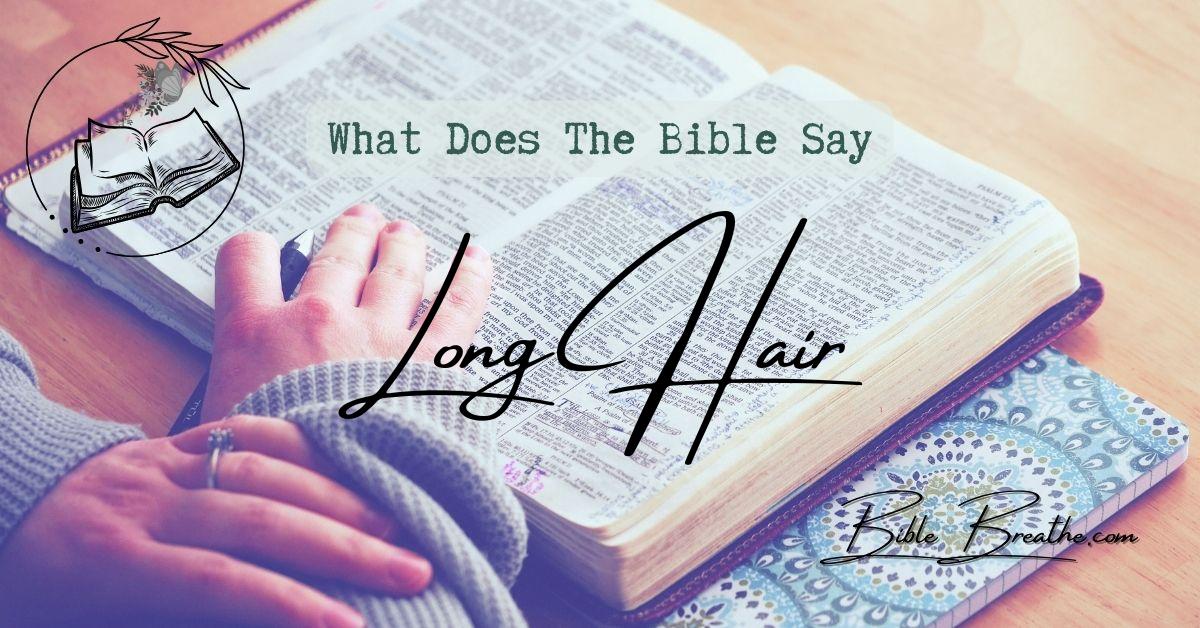Long hair in the Bible?
You might picture Samson’s epic mane or those flowing locks in ancient tales.
But let’s dig deeper into this sacred book.
See, God’s Word has a lot to say about our tresses, and it’s not just about looks.
The Bible brings us divine wisdom on hair, like the Nazirite vow or the intriguing “disgraceful hair” mention in 1 Corinthians 11.
In biblical times, hair wasn’t just style – it had deep cultural and religious meaning.
It was tradition, it was modesty, it was a woman’s glory.
But here’s the kicker: the Bible’s take on hair isn’t one-size-fits-all.
Some saw it as a badge of honor, while others called it disgrace.
It stirs up questions about head coverings, interpretations, and the richness of these ancient practices.
Join me on this journey as we unpack the Bible’s teachings on long hair.
It’s a fascinating dive into tradition, modesty, and spiritual symbolism, shaping our lives even today.
🌟
Key Takeaways
- The Bible contains specific references to hair length, often tied to cultural practices and norms of the time. For example, in the New Testament, there are passages that discuss hair length in the context of gender distinctions and cultural expectations.
- Modern interpretations of the Bible’s teachings on hair length vary among different Christian denominations and individuals. Some emphasize personal conviction and cultural context when determining appropriate hairstyles, recognizing that societal norms regarding hair have evolved over time.
- Hair, as a symbol, carries deep significance in many religious and cultural traditions. It can represent various aspects, including identity, spirituality, and cultural heritage. In some cases, individuals may choose to maintain certain hairstyles as an expression of their faith or cultural heritage.
- The Bible’s teachings on hair should be approached with an understanding of their historical and cultural context. While the Bible does provide guidelines on this topic, it is important for individuals to consider their own convictions, cultural practices, and the broader principles of love, respect, and devotion to God when making decisions about their personal appearance, including hair length.
Flowing Locks: Delving into the Bible’s Take on Long Hair
Photo modified by BibleBreathe.com. Original photo by Nathan Dumlao on Unsplash
Ah, the topic of long hair, a strand woven into the biblical fabric, carrying more than just a stylish flair.
Let’s dive into the good book to grasp the divine wisdom it holds regarding this matter.
A Crown of Glory: 1 Corinthians 11:15
In the Bible’s grand tapestry, 1 Corinthians 11:15 shines brightly, affirming the magnificence of a woman’s long hair.
Picture this: “The flowing locks of a woman are her crown of glory, a natural adornment bestowed upon her.” – 1 Corinthians 11:15 (KJV).
It’s like a queen’s majestic crown, symbolizing a woman’s innate beauty and honor.
Hair and Culture: 1 Corinthians 11:14
In the kaleidoscope of biblical culture, hair length had its own language.
“Doth not even nature itself teach you, that, if a man have long hair, it is a shame unto him?” – 1 Corinthians 11:14 (KJV).
Imagine it like an ancient fashion statement—long hair on men wasn’t in vogue back then.
Understanding this historical backdrop enriches how we see the Scriptures.
The Nazirite Vow: Numbers 6:5 & Judges 13:5
Ever heard of the Nazirite vow?
It was a sacred promise, a bit like a cosmic promise ring, where individuals didn’t snip their hair as a sign of dedication to God.
Numbers 6:5 gives us a peek into this vow, a symbol of devotion.
Also, Judges 13:5 shines a light on this Nazirite commitment, starting even before birth.
Imagine the sanctity and purpose wrapped up in uncut hair!
Understanding the Tapestry: 1 Corinthians 11:1-34
To truly grasp what the Bible says about hair, we need to take a look at the bigger picture in 1 Corinthians 11:1-34.
This passage isn’t just about hair—it’s about head coverings, cultural norms during worship, and understanding these ancient practices.
It’s like reading between the lines, but in this case, it’s reading between the strands of hair.
As we journey through these verses, we unwrap a rich tapestry of divine wisdom and symbolism.
Long hair, a glorious symbol for women, and the Nazirite vow, a sacred promise, are all intricately woven within the cultural and spiritual fabric of the Bible.
Let’s approach these teachings with reverence, embracing the deeper meanings they convey.
Long hair or short, what matters is understanding the message in every strand.
🌟
Let’s Untangle the Biblical Message on Hair Length
Photo modified by BibleBreathe.com. Original photo by Alexandru Zdrobău on Unsplash
In the ancient times when sandals and scrolls were the norm, hair wasn’t just hair.
It was like a canvas, painting a story of traditions and beliefs.
A Glimpse Back in Time
Imagine strolling through the ancient Middle East.
Hair was a big deal.
It wasn’t just about looks; it was like wearing your beliefs on your head.
Long hair was a symbol, like a crown of dedication, strength, and culture.
In those biblical days, folks took vows about their hair.
It was like a commitment ceremony with their locks.
One well-known vow was the Nazirite vow, where you let those tresses grow wild and free, showing everyone you were dedicating some time to the big Guy upstairs.
Flipping Through the Bible’s Hair Pages
Now, let’s crack open our Bibles to 1 Corinthians 11.
Paul, a key player in the early Christian scene, is giving some advice on head coverings during prayers and prophesying.
He talks about hair, too, and how it fits into this spiritual puzzle.
“If a woman’s got long hair, it’s like her crown. It’s her thing. God approves.” – 1 Corinthians 11:15 (KJV)
This verse says that back then, long hair on a woman was like a badge of honor.
It showed her respect for the divine and her understanding of the culture’s ways.
Finding the Threads of Meaning
So, what’s the deal with all this hair talk?
Back then, hair was like a spiritual accessory.
It said, “Hey, I’m committed.
I’m in sync with the divine vibes.”
It was a message that went beyond the surface and got woven into the fabric of life.
In a world where hair was more than just style, we see that even the simplest things carried deep meaning.
It was a message of dedication, not just a ‘do.
So, the next time you think about hair, remember, it’s not just about looks; it’s about the story it tells.
🌟
Balancing the Strands: Navigating Modern Views on Hair Length with Faithful Wisdom
Photo modified by BibleBreathe.com. Original photo by Geron Dison on Unsplash
In our fast-paced world, the ancient talk about hair length still stirs hearts in Christian circles, sparking debates and diverse perspectives.
Let’s dive into the fray and see how our modern minds interpret this age-old biblical theme while juggling cultural norms and the weight of scriptural wisdom.
Today’s Christian Outlook
In the tapestry of contemporary Christianity, views on hair length are as varied as shades in a rainbow.
Some hold tight to literal readings of biblical verses, seeing uncut hair as a mark of deep religious commitment.
Others, though, focus on what’s within—a heart devoted to God.
How do we blend the old teachings with our modern realities?
In this pondering, we can’t skip the Nazirite vow or Paul’s insights in 1 Corinthians 11.
Grasping the historical backdrop and the symbolic meaning behind these teachings can guide us toward a balanced understanding.
Bridging Culture and Scripture
The challenge lies in bridging today’s norms with the ancient teachings.
Our current society dances to a different tune compared to days of old.
“For the letter killeth, but the spirit giveth life.” – 2 Corinthians 3:6 (KJV).
This biblical wisdom nudges us to seek the living spirit in the written word, adapting its timeless truths to our here and now while preserving the essence.
So, we’re on a tightrope, acknowledging the beauty of traditions while honoring the transformative power of faith.
By embracing the symbolism from yesteryears and discerning the eternal truths they carry, we create a meaningful blend of the past and present.
Let’s Talk and Listen
In this faith-filled discussion, respect is our guiding star.
Engaging in conversations that embrace diverse perspectives nurtures growth, understanding, and unity within the body of Christ.
Our calling isn’t just to read the scriptures but also to love and understand, just as Christ did.
In this maze of interpretations and debates, let’s sprinkle grace and compassion generously.
After all, it’s our collective journey of faith and the love we extend that truly mirrors the grace of God.
So, whether long hair or short, let our love be the measure of our faith’s glory.
🌟
Frequently Asked Questions (FAQs) About What Does The Bible Say About Long Hair
Why is long hair considered a woman’s glory in the Bible?
Long hair being considered a woman’s glory in the Bible is a cultural context.
It reflects the customs of the time, where long hair was often seen as a symbol of femininity and modesty.
The emphasis is on modesty and cultural expectations.
What is the Nazirite vow and its relation to hair?
The Nazirite vow, described in Numbers 6, involves a commitment to God, including abstaining from wine and not cutting one’s hair.
The uncut hair symbolizes consecration to God and a sign of devotion during the vow’s duration.
How have interpretations of these verses changed over time?
Interpretations have evolved due to cultural shifts, advances in historical understanding, linguistic studies, and theological developments.
Changes in societal norms and varying perspectives have influenced how some verses are understood over time.




